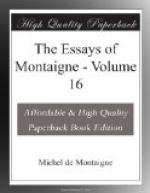Moreover, it seems to subjects, who are spectators of these triumphs, that their own riches are exposed before them, and that they are entertained at their own expense: for the people are apt to presume of kings, as we do of our servants, that they are to take care to provide us all things necessary in abundance, but not touch it themselves; and therefore the Emperor Galba, being pleased with a musician who played to him at supper, called for his money-box, and gave him a handful of crowns that he took out of it, with these words: “This is not the public money, but my own.” Yet it so falls out that the people, for the most part, have reason on their side, and that the princes feed their eyes with what they have need of to fill their bellies.
Liberality itself is not in its true lustre in a sovereign hand: private men have therein the most right; for, to take it exactly, a king has nothing properly his own; he owes himself to others: authority is not given in favour of the magistrate, but of the people; a superior is never made so for his own profit, but for the profit of the inferior, and a physician for the sick person, and not for himself: all magistracy, as well as all art, has its end out of itself wherefore the tutors of young princes, who make it their business to imprint in them this virtue of liberality, and preach to them to deny nothing and to think nothing so well spent as what they give (a doctrine that I have known in great credit in my time), either have more particular regard to their own profit than to that of their master, or ill understand to whom they speak. It is too easy a thing to inculcate liberality on him who has as much as he will to practise it with at the expense of others; and, the estimate not being proportioned to the measure of the gift but to the measure of the means of him who gives it, it comes to nothing in so mighty hands; they find themselves prodigal before they can be reputed liberal. And it is but a little recommendation, in comparison with other royal virtues: and the only one, as the tyrant Dionysius said, that suits well with tyranny itself. I should rather teach him this verse of the ancient labourer:
["That whoever will
have a good crop must sow with his hand, and not
pour out of the sack.”—Plutarch,
Apothegms, Whether the Ancients
were more excellent
in Arms than in Learning.]
he must scatter it abroad, and not lay it on a heap in one place: and that, seeing he is to give, or, to say better, to pay and restore to so many people according as they have deserved, he ought to be a loyal and discreet disposer. If the liberality of a prince be without measure or discretion, I had rather he were covetous.
Royal virtue seems most to consist in justice; and of all the parts of justice that best denotes a king which accompanies liberality, for this they have particularly reserved to be performed by themselves, whereas all other sorts of justice they remit to the administration of others. An immoderate bounty is a very weak means to acquire for them good will; it checks more people than it allures:




